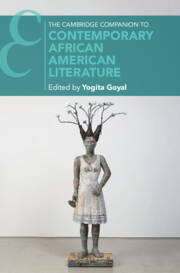Book contents
- The Cambridge Companion to Contemporary African American Literature
- The Cambridge Companion to Contemporary African American Literature
- Copyright page
- Contents
- Contributors
- Acknowledgments
- Chronology
- Introduction
- Part I Histories of the Present
- Part II African American Genres
- Part III Mapping New Identities and Geographies
- 10 Feminist Intersections
- 11 Queer Bodies in Time
- 12 Global and Diasporic Worldmaking
- Part IV Critical Approaches
- Further Reading
- Index
- Cambridge Companions To …
10 - Feminist Intersections
from Part III - Mapping New Identities and Geographies
Published online by Cambridge University Press: 14 December 2023
- The Cambridge Companion to Contemporary African American Literature
- The Cambridge Companion to Contemporary African American Literature
- Copyright page
- Contents
- Contributors
- Acknowledgments
- Chronology
- Introduction
- Part I Histories of the Present
- Part II African American Genres
- Part III Mapping New Identities and Geographies
- 10 Feminist Intersections
- 11 Queer Bodies in Time
- 12 Global and Diasporic Worldmaking
- Part IV Critical Approaches
- Further Reading
- Index
- Cambridge Companions To …
Summary
Among the challenges to Black feminist tradition today is a gap between the visibility of intersectional disparities faced by Black women and nonbinary people, and the mobilization of this knowledge to meet problems such as economic precarity and sexual and gender discrimination. Ironically, as the rhetoric of intersectionality has become central to diversity and equity initiatives in academia and publishing, in its institutional iterations, intersectionality has moved away from earlier Black feminist commitments to dismantling systems of inequity, discrimination, and oppression. Contemporary African American literature reflects anxiety about intersectionality’s conflicted service to the individualistic values of neoliberal capitalism while recognizing it remains powerful for critiquing and refining Black feminist priorities and politics surrounding solidarity. This ambivalence is seen in the narratives discussed in this chapter, in particular, in the way they turn to intersectional logics to think through problems of transnational coalition building, gender and sexual discrimination, and economic precarity. This chapter argues that contemporary African American literature reflects anxiety about Black feminist ideas without commensurate gains in equality, safety, and freedom for Black women, providing stark representations of Black female personhood that articulate the urgency of moving beyond this impasse to face the challenges of our time.
Keywords
- Type
- Chapter
- Information
- Publisher: Cambridge University PressPrint publication year: 2023

